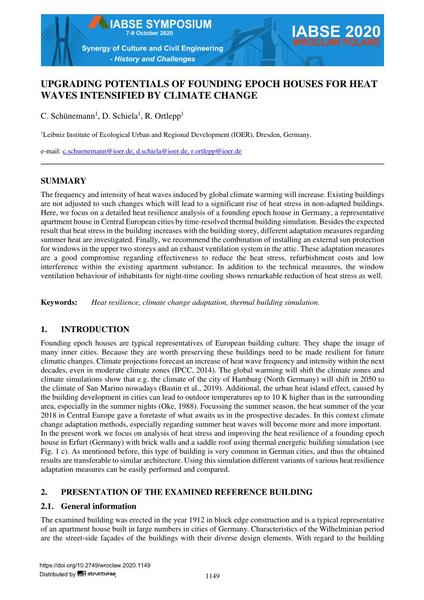Upgrading Potentials of Founding Epoch Houses for Heat Waves Intensified by Climate Change

|
|
|||||||||||
Bibliografische Angaben
| Autor(en): |
C. Schünemann
D. Schiela R. Ortlepp |
||||
|---|---|---|---|---|---|
| Medium: | Tagungsbeitrag | ||||
| Sprache(n): | Englisch | ||||
| Tagung: | IABSE Symposium: Synergy of Culture and Civil Engineering – History and Challenges, Wrocław, Poland, 7-9 October 2020 | ||||
| Veröffentlicht in: | IABSE Symposium Wroclaw 2020 | ||||
|
|||||
| Seite(n): | 1149-1156 | ||||
| Anzahl der Seiten (im PDF): | 8 | ||||
| Jahr: | 2020 | ||||
| DOI: | 10.2749/wroclaw.2020.1149 | ||||
| Abstrakt: |
The frequency and intensity of heat waves induced by global climate warming will increase. Existing buildings are not adjusted to such changes which will lead to a significant rise of heat stress in non-adapted buildings. Here, we focus on a detailed heat resilience analysis of a founding epoch house in Germany, a representative apartment house in Central European cities by time-resolved thermal building simulation. Besides the expected result that heat stress in the building increases with the building storey, different adaptation measures regarding summer heat are investigated. Finally, we recommend the combination of installing an external sun protection for windows in the upper two storeys and an exhaust ventilation system in the attic. These adaptation measures are a good compromise regarding effectiveness to reduce the heat stress, refurbishment costs and low interference within the existing apartment substance. In addition to the technical measures, the window ventilation behaviour of inhabitants for night-time cooling shows remarkable reduction of heat stress as well. |
||||
| Stichwörter: |
thermische Gebäudesimulation
|
||||
